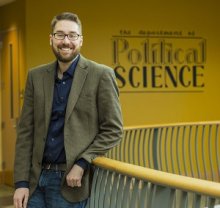“The Cognitive Roots of Misperceptions About Party Composition,” Douglas Ahler, Florida State University

AMERICAN POLITICS & PUBLIC POLICY WORKSHOP
Abstract: Americans believe that party-stereotypical groups compose much larger shares of “their” parties than they actually do. For instance, citizens believe that 32% of Democrats are LGBT (vs. 6% in reality) and that 38% of Republicans earn over $250,000 per year (vs. 2% in reality). These misperceptions fuel mass polarization: across multiple experiments, participants given correct information about out-party composition report reduced animus toward that party and its supporters. While these surprisingly inaccurate beliefs about parties have affective consequences, we assert that they have their roots in common cognitive biases. In this talk, I will explore one such bias—representativeness bias (e.g., Tversky and Kahneman 1974)—and its formative effect on party stereotypes. We start with the fact that people tend to think about political parties in terms of longer-standing social groups (Green, Palmquist and Schickler 2002; Busby et al. 2016). Often, the groups that people associate with a party tend to be those that overwhelmingly favor that party—or “representative” groups, which distinguish party members from non-members—regardless of the degree to which they compose the party. We provide experimental evidence that this way of conceptualizing parties undergirds misperceptions about party composition. Consistent with representativeness bias, respondents given groups’ base rates in the U.S. population generally fail to use this helpful information. When given information about the percentage of group members belonging to “their” stereotypical party, however, respondents update their beliefs about the percentage of party members belonging to that group—especially for highly representative groups.
Douglas J. Ahler is Assistant Professor of Political Science at Florida State University. Doug’s research focuses on American politics, representation, public opinion, and political psychology. His work has appeared in The Journal of Politics, Legislative Studies Quarterly, and Political Behavior. A lifelong Californian, Doug graduated from Occidental College in 2006, earned a M.Ed. from UCLA in 2008 (and subsequently taught high school in Los Angeles), and received his PhD from the University of California, Berkeley in 2016.
Cosponsored with the Institution for Social and Policy Studies, each seminar features a presentation of current political science research by leading scholars in the field, including distinguished faculty from other institutions, research fellows of the CSAP, and Ph.D. candidates at Yale.